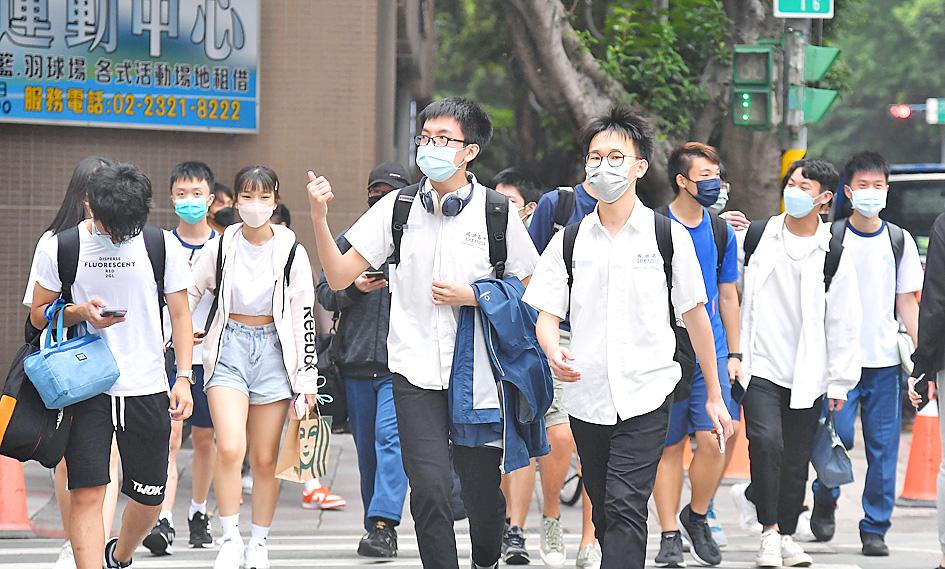From the next school year, students are no longer required to embroider their names on their school uniforms, Minister of Education Pan Wen-chung (潘文忠) said yesterday.
The Taiwan Youth Association for Democracy said it had received complaints from students who had been harassed by people who had seen their names on their uniforms and found their information online.
The K-12 Education Administration convened a meeting involving all education-related authorities, including representative groups for school presidents, parents and students, to discuss the issue, Pan said.

Photo: CNA
All who were present agreed that students’ names should be dropped from their uniforms, but their numbers should be kept, as they could be used to identify them in an emergency, he said.
The Ministry of Education found that one-quarter of all schools in the country demand that only male students embroider their names on their uniforms, Pan said adding that schools should not discriminate based on gender.
At present, 8 percent of elementary schools require their students to have their names on their uniforms, while half of all junior-high and high schools have the requirement, Pan said.
Official notices would be sent to all authorities and schools as soon as possible, and all schools should involve parents and students and come to a conclusion that would observe the ministry’s decision before the start of the next term in August, Pan said.
It is hoped that all uniform and dress code committees discuss the issue objectively and refrain from adopting measures for the pure sake of management, Pan said.
Pan also said that he hoped schools would begin reviewing other antiquated regulations, such as forbidding students to wear warmer clothing on colder days.
Separately, the association praised the ministry’s decision, but said that schools should involve student representatives when discussing dress code policies.
The association said it respects the opinions of others regarding the decision to keep student identification numbers on uniforms, adding that it hoped all students’ right to privacy would be protected.

The Chinese Communist Party (CCP) is pushing for residents of Kinmen and Lienchiang counties to acquire Chinese ID cards in a bid to “blur national identities,” a source said. The efforts are part of China’s promotion of a “Kinmen-Xiamen twin-city living sphere, including a cross-strait integration pilot zone in China’s Fujian Province,” the source said. “The CCP is already treating residents of these outlying islands as Chinese citizens. It has also intensified its ‘united front’ efforts and infiltration of those islands,” the source said. “There is increasing evidence of espionage in Kinmen, particularly of Taiwanese military personnel being recruited by the

ENTERTAINERS IN CHINA: Taiwanese generally back the government being firm on infiltration and ‘united front’ work,’ the Asia-Pacific Elite Interchange Association said Most people support the government probing Taiwanese entertainers for allegedly “amplifying” the Chinese Communist Party’s propaganda, a survey conducted by the Asia-Pacific Elite Interchange Association showed on Friday. Public support stood at 56.4 percent for action by the Mainland Affairs Council and the Ministry of Culture to enhance scrutiny on Taiwanese performers and artists who have developed careers in China while allegedly adhering to the narrative of Beijing’s propaganda that denigrates or harms Taiwanese sovereignty, the poll showed. Thirty-three percent did not support the action, it showed. The poll showed that 51.5 percent of respondents supported the government’s investigation into Taiwanese who have

Left-Handed Girl (左撇子女孩), a film by Taiwanese director Tsou Shih-ching (鄒時擎) and cowritten by Oscar-winning director Sean Baker, won the Gan Foundation Award for Distribution at the Cannes Critics’ Week on Wednesday. The award, which includes a 20,000 euro (US$22,656) prize, is intended to support the French release of a first or second feature film by a new director. According to Critics’ Week, the prize would go to the film’s French distributor, Le Pacte. "A melodrama full of twists and turns, Left-Handed Girl retraces the daily life of a single mother and her two daughters in Taipei, combining the irresistible charm of

South Korean K-pop girl group Blackpink are to make Kaohsiung the first stop on their Asia tour when they perform at Kaohsiung National Stadium on Oct. 18 and 19, the event organizer said yesterday. The upcoming performances will also make Blackpink the first girl group ever to perform twice at the stadium. It will be the group’s third visit to Taiwan to stage a concert. The last time Blackpink held a concert in the city was in March 2023. Their first concert in Taiwan was on March 3, 2019, at NTSU Arena (Linkou Arena). The group’s 2022-2023 “Born Pink” tour set a